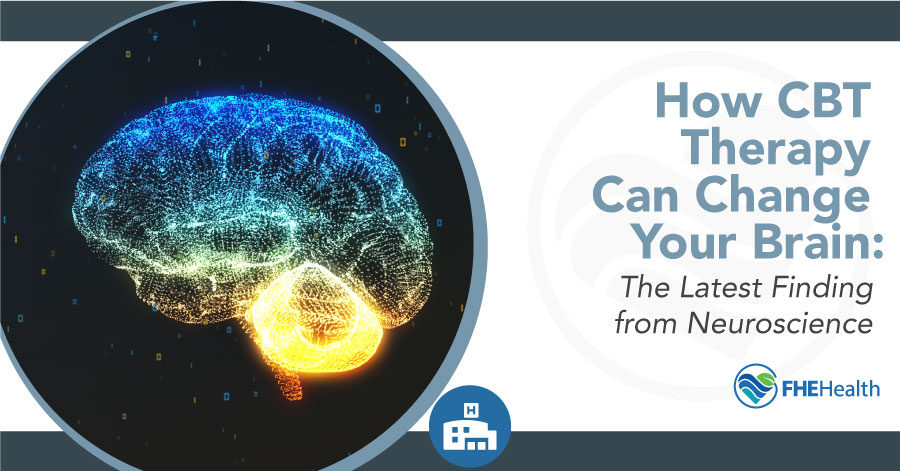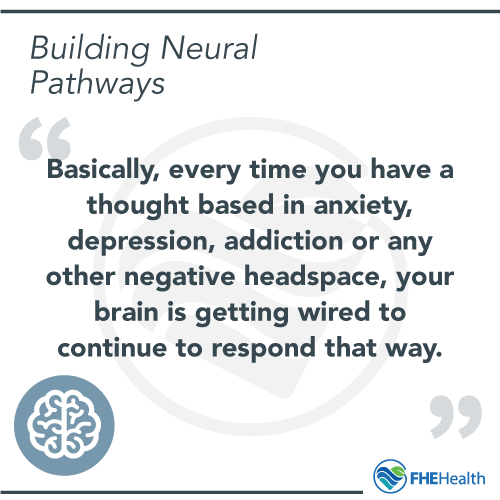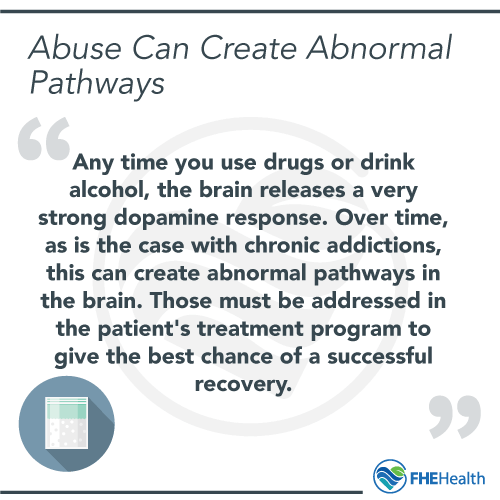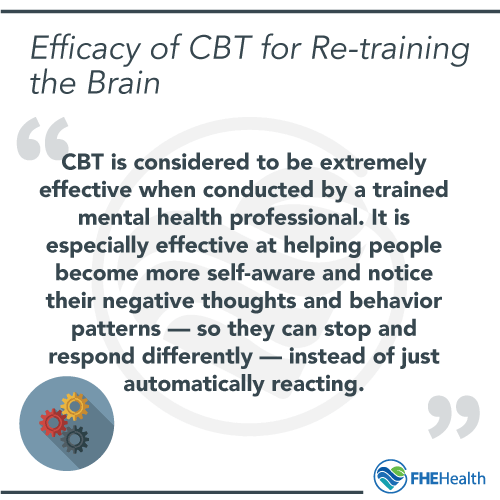
When it comes to substance abuse and addiction issues, each person’s treatment program is going to be different to take into account their specific histories and future goals. However, cognitive-behavioral therapy (CBT) is one of the most-used components and can help with everything from anxiety and depression to negative thoughts about yourself.
Does CBT change the brain? In short, yes. It works to help change the brain’s pathways and teach it a new, healthier way to process thoughts and behaviors.
The Influence of Brain Pathways on Thought Processes and Behaviors
 A person’s thoughts and behaviors are largely dependent on habit. This is one reason why you crave a cup of coffee in the morning or drive the same route to and from work every day. Every time you have a thought or behave a certain way in reaction to a stimuli or situation, a pathway forms in your brain. These are called neural pathways, and they convey the electrical signals that control literally everything you do and think so quickly. The more you think a certain thought or perform a certain action, the deeper that pathway becomes and the quicker your brain defaults to going in that direction.
A person’s thoughts and behaviors are largely dependent on habit. This is one reason why you crave a cup of coffee in the morning or drive the same route to and from work every day. Every time you have a thought or behave a certain way in reaction to a stimuli or situation, a pathway forms in your brain. These are called neural pathways, and they convey the electrical signals that control literally everything you do and think so quickly. The more you think a certain thought or perform a certain action, the deeper that pathway becomes and the quicker your brain defaults to going in that direction.
We form these neural pathways without any kind of conscious effort, and the amygdala region of the brain — which is responsible for helping process emotions — plays a key role. Basically, every time you have a thought based in anxiety, depression, addiction or any other negative headspace, your brain is getting wired to continue to respond that way. While this can certainly make it more difficult to change your thought and behavior patterns, it is possible to do so.
EEG Brain Mapping to Measure Brain Activity
While it may seem like something out of a science fiction movie, it’s possible to actually see your brain’s activity and measure how it responds to different stimuli and environments. EEG brain mapping allows health care providers to see if there is any unusual brain activity and rule out any medical issues that may be impacting substance abuse or other mental health disorders.
This is especially important for those who have abused drugs and alcohol in the past because these substances can affect your brain’s responses. Any time you use drugs or drink alcohol, the brain releases a very strong dopamine response. Over time, as is the case with chronic addictions, this can create abnormal pathways in the brain. Those must be addressed in the patient’s treatment program to give the best chance of a successful recovery.
At FHE Health, we use EEG brain mapping as just one of our treatment tools to get a better overall picture of what may be contributing to a patient’s issues and to help us develop the best treatment plan possible.
Changing Your Brain
 While it’s largely accepted in the scientific community that most of the brain’s neural pathways will be solidified by age 25, this doesn’t mean that there’s no hope of changing your brain. Far from it, actually. The human brain is incredibly flexible and is wired to be able to adjust to different stimuli. This means that as long as you’re dedicated to the repetition and time it takes to change the brain’s pathways, it’s definitely possible to influence the brain and therefore your thoughts and behaviors. Strategies like meditation and group therapy can go a long way, but CBT offers a unique way to help change your brain.
While it’s largely accepted in the scientific community that most of the brain’s neural pathways will be solidified by age 25, this doesn’t mean that there’s no hope of changing your brain. Far from it, actually. The human brain is incredibly flexible and is wired to be able to adjust to different stimuli. This means that as long as you’re dedicated to the repetition and time it takes to change the brain’s pathways, it’s definitely possible to influence the brain and therefore your thoughts and behaviors. Strategies like meditation and group therapy can go a long way, but CBT offers a unique way to help change your brain.
Does CBT change the brain?
If you’re wondering if you can change your brain with therapy, the answer is yes. CBT was designed by a psychiatrist in the 1960s who thought that putting together a three-pronged approach of mindfulness, journaling and situational exercises — such as role-playing — could help people change their thought patterns and affected behaviors, and he was right.
According to a study published in the Journal of Neuropsychiatry and Clinical Neurosciences, CBT was shown to be effective in treating anxiety disorders and helping with obsessive thoughts. CBT works by basically coaching your brain through a different reaction process, which can be either thoughts or behaviors, and therefore rewiring the brain and changing those neural pathways over time.
How effective is CBT therapy?
 CBT is considered to be extremely effective when conducted by a trained mental health professional. It is especially effective at helping people become more self-aware and notice their negative thoughts and behavior patterns — so they can stop and respond differently — instead of just automatically reacting. CBT is a generally a short-term program lasting around 12 to 16 weeks, with frequent sessions with a therapist and homework to be completed by the patient on their own. Patient buy-in is critical to the success of CBT, because the process hinges on becoming more self-aware and being consistent in applying the tools and techniques taught in therapy.
CBT is considered to be extremely effective when conducted by a trained mental health professional. It is especially effective at helping people become more self-aware and notice their negative thoughts and behavior patterns — so they can stop and respond differently — instead of just automatically reacting. CBT is a generally a short-term program lasting around 12 to 16 weeks, with frequent sessions with a therapist and homework to be completed by the patient on their own. Patient buy-in is critical to the success of CBT, because the process hinges on becoming more self-aware and being consistent in applying the tools and techniques taught in therapy.
While CBT can be done on its own, it works best as part of a comprehensive treatment plan and has been found to be even more effective when combined with medications.
What kinds of issues can CBT help treat?
Cognitive-behavioral therapy has been shown to be effective in helping treat a variety of mental health conditions, including depression, anxiety, bipolar disorder, schizophrenia, anger and stress disorders as well as substance abuse problems. Keep in mind, however, that CBT is just one aspect of treatment and is not a cure or a standalone therapy method. It should be used with the guidance of a qualified mental health professional and as part of a holistic, individualized treatment plan.
If you’re interested in finding out more about how cognitive behavioral therapy may be able to help you change your brain and bring about more positive, healthy thought and behavior patterns, contact FHE Health today. Our representatives are available to answer your questions and guide you in your next steps.






